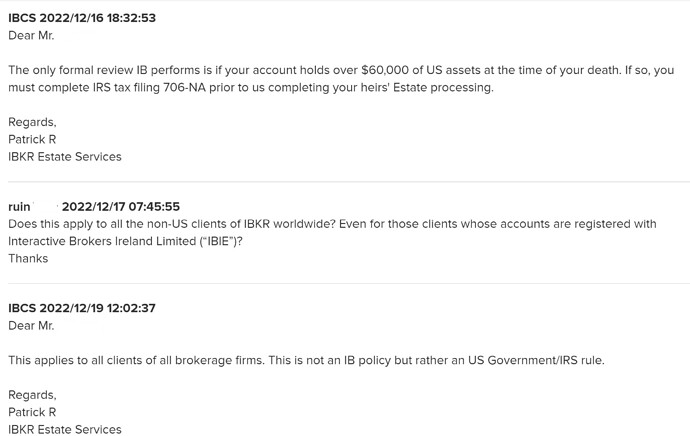Entiendo perfectamente lo que proponéis pero en mi caso particular prefiero ceñirme a la estricta legalidad y no complicarle la vida a mis herederos de forma innecesaria. Si ello implica no poder hacer crecer la cartera en IBKR como a mí me gustaría pues no me quedara otra que buscar una alternativa.
Dear Ruindog,
That is correct, the same to non-US account registered IB-IE.

Huele a una avalancha traspasos que tira “patrassss”…
Mientras tanto en ING…

El 65,90% del valor de mercado de mi cartera pertenece a “US based assets” ![]()
Ese señor se acababa de enterar del porcentaje de subida de su pensión
![]()
![]()
![]() ¿tocan traspaso a ing antes de fin de año para intentar evitar el modelo 720?
¿tocan traspaso a ing antes de fin de año para intentar evitar el modelo 720?
Una cosa no me ha quedado clara……¿el problema viene cuando te mueres o cuando vendes?
A mi me afectaría pero todavía soy joven , pero me da mucha pereza cambiar de broker
Cuando palmas.
Para los alemanes del foro, no hay de que temer. Aquí hay un enlace por ejemplo que he encontrado, pero debido a que Alemania si tiene tratado de doble imposición en esto no habría que pagar:
Individuals who are not domiciled in the U.S. can also be subject to U.S. estate tax. However, their estates are subject to estate tax on U.S. assets only, not worldwide assets. Instead of receiving the benefit of an $12,060,000 exemption, they are entitled to an exemption of only $60,000. Effective January 1, 2013, the U.S. estate tax rates start at 18% and increase to a maximum of 40% on property valued at $1,000,000 and above. There is no automatic exemption for property passing to the spouse, unless the surviving spouse is a U.S. citizen, which is rarely the case.
While the U.S. is generally regarded as somewhat of a tax haven in terms of its income taxes, the estate tax on nondomiciliaries can be onerous. To illustrate the severity of the tax, property valued at $500,000 would result in a U.S. estate tax of $142,800. This is payable to the IRS no later than 9 months after date of death and, if not paid timely, is subject to penalties and interest, which would be added to the estate tax.
German residents have significant advantages over residents of other countries due to the favorable provisions contained in the estate tax treaty between the U.S. and Germany. Under the treaty, if a German decedent bequeaths the U.S. property to his or her German surviving spouse, 50% of the value of the property is excluded from U.S. estate taxation. In addition to this 50% exclusion, the German decedent’s estate would receive a deduction of up to $12,060,000 (for deaths occurring in 2022) on the remaining value of the U.S. property. If any taxable amount remains after the application of the marital exclusion and the marital deduction, the estate is allowed a pro-rata portion of the credit afforded to U.S. citizens and domiciliaries based on the value of their U.S. assets to their worldwide assets. This credit is known as the “unified credit.”
The following examples show how the U.S. estate tax is calculated on the estate of a German resident. All values are stated in terms of U.S. dollars.
A ver si sigo investigando y envío también un mensaje a IBKR en alemán para comentar esto.
La lista de países con tratado de doble imposición es esta:
Foreign countries with estate tax treaties are:
- Australia
- Austria
- Canada
- Denmark
- Finland
- France
- Germany
- Greece
- Ireland
- Italy
- Japan
- Netherlands
- South Africa
- Switzerland
- United Kingdom
Entiendo que aún así los herederos de un ciudadano alemán no estarían exentos de realizar el trámite con el IRS y proporcionar el formulario 5173 a Interactive Brokers. Pero bueno, infinitamente mejor que cualquier país sin tratado.
Muy justo de fechas lo veo y dependerá en gran medida de lo que hagas con el resto de tus acciones que no se ven afectadas por este impuesto.
¿Y si se utiliza la plataforma de IBKR a través de un intermediario como ActivoTrade?
No te quita de hacer el 720 pero entiendo que debería servir para evitar el Federal Estate Tax ya que se utilizaría una cuenta ómnibus y seríais clientes de un broker español, con lo que a ojos del tío Sam el propietario de las acciones no sería una persona física, o eso creo…
Eso sí, las comisiones son un poco más altas, 7 USD de compra mínima, 5 USD por cambio de divisa; pero nada de otro mundo y que os permitiría seguir conduciendo un Ferrari.
Entiendo tu postura.
Cumplir la legalidad es siempre lo correcto y evita futuros problemas a los que nos suceden
¿Tenemos la certeza de que ING, R4 y demás brokers no aplican esta política? Porque si hay dudas en breve me veréis posteando solo en los hilos de la cartera de Bass y el de carteras indexadas y roboadvisors…![]()
![]()
![]()
Pues yo en ING también tengo más de 60.000 eur en acciones americanas…
![]()
Eso mismo pregunté yo unos posts más arriba pero “nobody knows it”.
Buenas a todos! Llevo siguiendo el tema desde fuera pero me acabo de crear cuenta porque necesito consultar mis dudas.
Yo, que estoy empezando en esto, que aún no tengo una mísera acción y que todo lo que tengo son unos 30k en fondos en myinvestor, pero que me estoy planteando empezar con divis, ¿qué debería hacer? Porque la cuenta de IBKR la tengo creada, pasé 100€ para ir aprendiendo a moverla pero sin comprar nada aún y con toda esta movida, estoy viendo que va a salir más rentable tirar de broker de myinvestor…
Aunque me jode bastante el porcentaje de cambio de divisa, que no tengan cuenta multidivisa y tal y como hasta los 60.000€ tengo margen…
¿Si empezarais hoy, qué haríais?
Es estate tax sólo aplica a acciones y ETFs estadounidenses, del resto puedes comprar a manos llenas.
Pues, acciones americanas en HeyTrade y europeas en IBKR. Asi nos dejamos de complicaciones.
